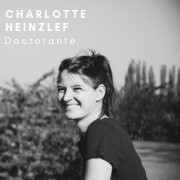Charlotte Heinzlef, PhD student UMR Espace - March 2019
On 8 March 2019, the Université d'Avignon invites you to discover some of the leading figures in university research in Avignon.Charlotte Heinzlef, doctoral student at UMR Espace.
What is your research about?
As a PhD student in Geography (Avignon University, UMR ESPACE) and Architecture (Mons Faculty of Architecture and Urban Planning, Belgium), my research focuses on the issue of flood risk in a context of climate change and over-urbanisation. In order to limit as far as possible the negative impact of the increase in natural disasters, both in terms of recurrence and intensity, the concept of resilience has gradually been incorporated into risk management strategies. However, the concept is still struggling to become operational, mainly because it is overused and lacks clarity and practical application. The aim of my work is to address these shortcomings and operationalise the concept of resilience through a collaborative approach with an area at risk. The aim of my research was therefore to clarify, define and characterise resilience capacities at local level (Avignon), in relation to flood risk, in order to design a holistic and collaborative decision-making tool and encourage the adoption of this concept in risk management strategies.

What are your current scientific activities?
Throughout my research, I have sought to communicate on the stakes of such a subject, via scientific conferences, particularly abroad (examples: SRA-E Conference 2018 27th Annual Conference of the Society for Risk Analysis Europe in June 2018, European Geosciences Union 2019, Vienna (Austria) in April 2019, Fifth World Congress on Risk - Society for Risk Analysis, Cape Town (South Africa) in May 2019), scientific articles (Serre, Heinzlef (2018), Assessing and mapping urban resilience to floods with respects to cascading effects through critical infrastructure networks, International Journal of Disaster Risk Reduction), but also outreach activities (Un chercheur à ma table editions 2017, 2018; Ma Thèse en 180 secondes, Belgian edition 2018; Fête de la science 2018; Midiscience 2019, etc.)
Why did you choose to work in academic research?
The decision to do a thesis came very late (Master 2). After two work placements during my studies (each lasting 6 months), I realised how lucky I was to be able to take the time to think about a subject, invest in it and make it my own, while at the same time enriching my personal and professional curiosity. This pleasure in discovering new themes was a link with my two years of literary preparatory classes, during which the pleasure of knowledge went beyond the simple need to acquire skills for a specific diploma. I was also lucky enough to have an applied thesis, which enabled me to learn more about the theoretical concepts I was using and also to analyse the practical interpretation of my work, particularly by the GIS department of the city of Avignon. Being able to count on my two thesis supervisors, both humanly and professionally, also enabled me to embark on the research adventure with confidence and pleasure!
What advice would you give to students who want to do research?
Research is a special field, both in everyday life (where you need to organise yourself independently) and in your future professional projects. The only rule is to love your subject and be enthusiastic about anything new! Contrary to my preconceptions (what a bore it would be to work on the same subject for three years...), everyday life in research changes every day! No two days are the same, from organising to reading to meeting new people! Doing research keeps you alert, critical and curious! As well as the need to be able to adapt to changes and unforeseen events, it's vital to have good support throughout the thesis! Trusting your supervisors and being able to communicate your doubts, misgivings and preferences are all necessary for a thesis to run smoothly, so it's important to think carefully about how the thesis itself is constructed.
Which object or image from your research best illustrates you?

Updated on 5 February 2024